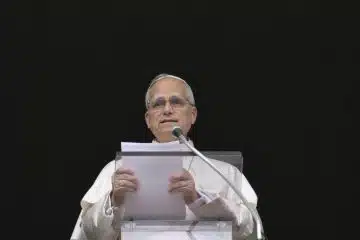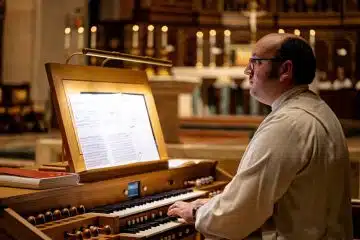Why is it Hard to Talk About Stewardship?
I kept asking myself that question as I endeavored to write this column. Maybe it’s the thought of asking for something (even though we voluntarily and willingly give on a monthly basis). Maybe it’s because talking about money often makes people uncomfortable.
In my quest to think more about stewardship and giving, especially in terms of giving to the Church, I turned to Bishop Robert Barron. He has a homily, “Give as God Gives,” that was published on YouTube about a year ago. I hit play, prepared to hear a message about why we should give our treasure to the Church and how it will return to us sevenfold. Instead, I was treated to a message about how the word “gift” in German means poison. That woke me up.
The point of Bishop Barron’s message is this: Gifts often come with implied obligation. If I give someone a Christmas gift, they feel compelled to give one back. If I receive a baby shower gift, I’m obligated to write a thank you card. Through cultural pressures and expectations, gifts can’t be freely given.
That’s important to acknowledge, Bishop Barron says, because: “Who can really, truly and fully give a gift? God. Why? Because God needs nothing. Our praise, our gratitude, anything we give to God adds nothing to God’s greatness. God is perfect. Everything we have is, in fact, already been given by God. There is nothing He needs in return. God, in other words, can be utterly gratuitous in His giving.”
Bishop Barron proceeds to give many examples of how bountiful God is in His gifts to us, then challenges viewers and listeners with this message: “Give without expecting return. Give in such a way that there are no strings attached.”
I meditated on that message as I finalized this issue of the magazine. When I had thought of stewardship, I thought of giving money. And that is a great, wonderful, needed thing for the Church to thrive. But as our writers interviewed parishioners at “stewardship parishes” and students who give so much more than just money, one thing became abundantly clear: all of these individuals offer their time and talents without expecting anything in return. They cook and serve meals to people they don’t know. They repair mailboxes for strangers out-of-town who they almost certainly will never see again. It’s a shift in mentality and a shift in expectations.
The inspiring stories in this month’s issue of The Catholic Telegraph highlight ways that everyone, from young children to high school football players to entire parishes, has shifted how they think about and offer stewardship as an extension of God’s gifts to His people. I hope that it challenges you to do the same.














